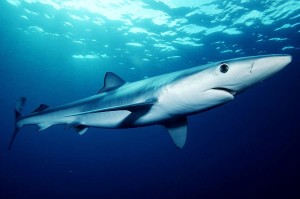Sharks are not mammals. Rather, they are a species of fish. Sharks have a skeleton that is entirely composed of cartilage and is equipped with leathery, tough and scale less skin. These skeletons differ greatly from those of the bony fish. Cartilage is durable, flexible and has about half the amount of density as bones. As a result this helps to conserves energy and reduces the skeleton’s weight. Sharks also lack a rib cage which would result in its own weight crushing it if it were placed on land. Sharks do not have lungs that breathe air. They breathe oxygen by passing water over their gills.
Unlike mammals which are warm blooded creatures, most sharks are cold blooded meaning that their internal body temperature matches that of their ambient environment. Another thing that makes sharks differ from other mammalian species is the way in which they digest their food. A shark has an extremely short intestine. This short length of the intestine is achieved by the spiral valve with multiple turns within a single short section instead of a long tube like intestine that many mammals possess. The valves provide a long surface area that requires food to circulate inside the shark’s short gut until it has been fully digested, when remaining waste products pass into the cloaca. A shark’s teeth are embedded in the gums rather than directly affixed to the jaw and are constantly replaced throughout its life. The jaw’s surface and its gill arches need extra support due to its heavy exposure to physical stress and its need for strength.
